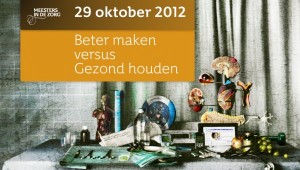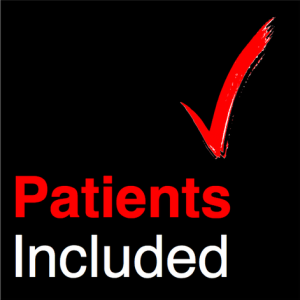Here’s a short piece I wrote for an event next Monday, October 29, at the Rijksmuseum in Amsterdam, hosted by KPN, the big Dutch telecom firm. The title is from a slide I used last spring at the Kanter Family Foundation’s Learning Health System conference. After, I’ll discuss the event – and some provocative questions.
___________

People perform better when they’re informed better
The e-patient movement – “empowered, engaged, equipped, enabled” – presents challenges to our culture: it creates new roles, new expectations, and new beliefs about what’s possible. It creates questions in the minds of educated people: can ordinary citizens, with no medical training, handle the truth? Handle new knowledge? Handle information that’s always lived in the hands of trained professionals?
We can’t see the future, but we can look to precedents – many precedents, in my life and long before.
Thirty years ago computer professionals raised the same questions about letting you and me have computers. It was hard to imagine that you and I, not trained as engineers, could understand these tools, much less do anything useful with them. The same happened in my industry – typesetting – when desktop publishing arrived: it was hard for us, the trained typesetters, to imagine ordinary citizens having fonts on those computers and making pages. But you did, and you do. Do you want to go back?
The problem is that our culture is challenged when tools and information reach people who’ve never had them before.
Sometimes the change is radical. When Gutenberg printed his Bible in 1455, it gave ordinary people access to knowledge that had previously belonged to the priesthood: instead of relying on another’s interpretation, they could read it themselves. Within a lifetime (1517), Martin Luther wrote his 95 Theses and the Reformation began.
That was a culture change – a big one – enabled by access to information.
Almost 500 years later the internet created a similar change, as big as Gutenberg’s: once again information had a way to move around in unprecedented ways. By 1999 four business visionaries wrote The Cluetrain Manifesto, following Luther, with their own 95 Theses, which basically said: “Hello, marketers: we can find and read things ourselves now – we’ll let you know if we need anything.” Today you can shop for all kinds of products – and get others’ opinions – by yourself.
Do you want to go back?
That’s how e-patients feel about access to medical knowledge and medical data.
Not everyone’s an e-patient; some just want to be taken care of, in the traditional way. But when a new-style “e-patient” cares about their care, wants to learn, and wants to track their condition, let’s help them learn to do it well. Give them better tools, better information, and help them learn what it means – so they can create more value in their own health and the public’s health.
They will have questions, which is the only way new people in any field learn what they’re doing. That’s a good thing, because healthcare needs all the help it can get. And as leading physicians have been saying for decades, patients are the most underused resource in healthcare.
But nobody can perform well if they’re not informed well – can you do your job if they leave out important facts? As I said in my talk at TEDx Maastricht: “Let patients help!”
________________________________
About the event – and a big question.
The event, “Masters in Health,” is hosted by KPN, the big Dutch telecom company. They asked me to write this for their Executive Summary, but they liked it enough that they pre-posted it on their “Day After Tomorrow” blog [about the near future]. :-)
 The event theme is “Make better [i.e. cure] vs. keep healthy,” and the event’s site asks provocative questions: (loosely translating as best I can, with Google’s help)
The event theme is “Make better [i.e. cure] vs. keep healthy,” and the event’s site asks provocative questions: (loosely translating as best I can, with Google’s help)
- What would happen if the country’s system shifted its emphasis to prevention?
- Is healthcare a responsibility of employers?
- In fact, for you as an individual, is health care a right, or is health itself your duty?
Note that last question: Mark my words, as patient engagement rolls out in America, and Accountable Care, that’ll be on the agenda – a lot. But here’s the thing: you can’t make people responsible for something and withhold relevant information.
That’s yet another reason why “give us our data” is a core issue in the future of healthcare. And that’s the point I’ll make.
About the Dutch
The Dutch healthcare system is not without its problems, but I love the way people I’ve met there think. Examples:
- Last year I visited a new hospital that bragged about having started with a used CT machine, at half the price of a new one. Can you imagine an American hospital doing that? (And trust me, most of the scanners I’ve seen look a lot older than that.)
- Prof. Dr. Jan Kremer’s in-vitro fertilization clinic gave its patient community an online forum to discuss what they’d want, if they could have anything, and promised to do it.
- The clinic’s new-patient brochure is now a wiki, maintained by the patient community(!). “We believe more in community than in authority,” Jan says.
- Lucien Engelen’s REshape Innovation Center hosted TEDx Maastricht, where I gave my notorious “Let Patients Help” talk.
 Talk about radical: almost half the speakers were patients! (See videos of some talks in my Grand Rounds post back then, including the inspiring “From God to Guide” by Parkinson’s specialist Bas Bloem and one of his patients.)
Talk about radical: almost half the speakers were patients! (See videos of some talks in my Grand Rounds post back then, including the inspiring “From God to Guide” by Parkinson’s specialist Bas Bloem and one of his patients.)- The very first announcement of that TEDx- a year in advance – talked about patients, the first speaker announced was a patient. (Have you ever heard of a medical conference that did that? And that was 2.5 years ago.)
- Lucien also invented the “Patients Included” badge, and declared that he himself won’t attend (or even speak at) events where patients don’t play an active role.
The Dutch healthcare system – including its culture – are different from America’s, but we have a lot in common: private insurance, growing problems caused by unhealthy behaviors (the Dutch used to be conspicuously lean, and that’s not always the case anymore), and concern about changes in doctor and patient roles as e-patients come to the fore. Some Dutch observers even worry that eHealth will raise costs because empowered patients might demand more care), so, they think, we’d be better off keeping things as they are.
Big questions to chew on. I look forward to engaging with thought leaders in a system that has much in common with ours but is at a different stage of development.
What do you think, wherever you are? Do you feel that you have a responsibility to stay healthy – for yourself, your family, your country? If so, what role do you think health data plays?


Do you want to go back? Great question, Dave: there are very few of us who’d want to turn back the march of history, especially when the powerful tide that’s washing in empowers humanity in ways that improve our lives.
Not in modern times, but still not so very long ago, there were well-meaning doctors who did not feel it was always proper to tell patients they were dying or even what they had. That doesn’t fly anymore and right behind it on the extinction list, in the future we’re now creating, is the idea that patients don’t need to fully understand and choose their treatment choices and don’t have a right to real-time copies of their own medical files and test results.
As your post shows so persuasively, patients for the first time having the tools to look at medical facts themselves is one of those forces of history, as revolutionary as the wheel, the printing press, trains, planes and the Internet. This trend, which can’t and won’t be turned back, is transforming medicine so enormously that in the future, folks will hardly be able to believe that there was a time patients knew so little about what was happening in their own bodies and had such a small voice in the decisions about what happens to their bodies.
So what do we do in 2012, trying to move this trend along as quickly as possible, to benefit as many people as possible and as soon as possible from a culture change in which doctors work more effectively than ever before, with empowered patients as full partners on options and choices?
Humans are conservative creatures, and in the face of scary diseases, there’s an overwhelming temptation to say: ‘Now’s not the time to rock the boat! I’m/my loved one is sick! Let’s just get through this.’ We’re pack animals, and very few of us, especially in the middle of a crisis, want to break with the crowd and do something different.
So consider this: work with your doctor as a full partner, get all your data, Google everything, find out about other patients’ experiences, ask every question, and you’ll not only get better care and the best possible outcome, you’ll also be part of the mainstream – the world that is coming into being right now. Yep, the march of history. No one wants to be left behind on that one.
I am from country where medicin sare is worst.croatia. Thats because we dont use our traditinal hilings in oficial medicine, even we have one of strongest herbs hiling trditions in the world. on that expirienc was bilt PLIVA Croatian factory of world succes but it was destroyed and we product :the first vitamin in the world(196o),aspirin , sumamed(first change for antibiotics)e.t.c. I am worcking my own natural hiling practicing ZOROASTRA SYSTEM,including estern and western traditions.And having 100%results on many”unsolvybl”desses like psoriqases migrenas lomalgias,heart and preser problems,owerweight ,and a lot off other problems. HELP me to HELP you.I teach and show this skills to anyone who is interested in